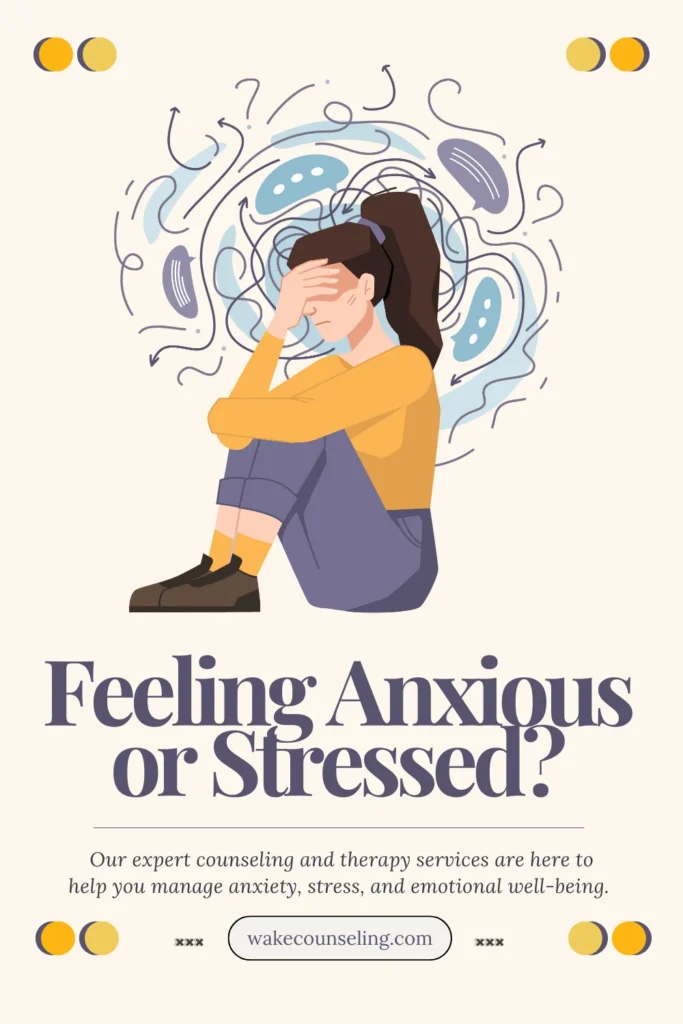Anxiety Treatment Near You
Comprehensive anxiety therapy to treat anxiety disorders, providing lasting relief and fostering peace of mind.
Take the first step towards healing
Anxiety Therapy
At Wake Counseling, our anxiety therapists provide effective anxiety treatment with a client-focused approach. We help you set realistic goals and develop a step-by-step action plan to help you achieve them.
With evidence-based therapy in a safe, supportive environment, our anxiety therapists can help you treat anxiety caused by persistent worry, panic attacks, and stress that is interfering with your life.
Schedule an intake appointment with an anxiety therapist today.


Anxiety therapy offers a safe and supportive space to explore and manage anxiety, helping individuals gain a deeper understanding of their thoughts, emotions, and triggers. Through evidence-based techniques like cognitive restructuring, mindfulness, and exposure therapy, individuals learn to reframe negative thought patterns and develop healthier coping strategies. Anxiety therapy also provides practical tools to:
- Navigate Stress
- Build Emotional Resilence
- Regain a Sense of Control
Anxiety therapy coupled with work from the patient can foster greater self-awareness, reduces avoidance behaviors, and empower individuals to face challenges with confidence, leading to lasting relief and improved overall well-being.
Here are some quick facts about anxiety to assure you you’re not alone:
- Anxiety disorders are the most common mental health issue in the U.S.
- Anxiety affects approximately 40 million adults aged 18 and older, which is about 19% of the population.
- Only about 36.9% of individuals with anxiety disorders seek treatment
You don’t have to continue suffering with anxiety. Reach out today to get the help you deserve and gain control of your life.
Anxiety Our Therapists Can Help With
Anxiety comes in many shapes and has varying effects on individuals. You may be afraid to leave your home, struggle with rumination, or feel like your life has been flipped upside down. No matter the cause of your anxiety or the symptoms you’re experiencing, our Raleigh-based anxiety therapists have experience treating the following (and more) anxiety disorders to help you get your life back.
Generalized Anxiety Disorder (GAD)
GAD includes excessive worry and anxious feelings about everyday situations. Individuals with GAD often feel on edge, struggle to concentrate, and may experience physical symptoms such as fatigue, muscle tension, and restlessness. Treating anxiety disorders like GAD typically involves working with a mental health professional who can provide cognitive-behavioral therapy (CBT), relaxation techniques, and proven therapy for anxiety to help manage your persistent worries.
Obsessive Compulsive Disorder (OCD)
Obsessive Compulsive Disorder (OCD) is a mental health condition characterized by intrusive, distressing thoughts (obsessions) and repetitive behaviors or rituals (compulsions) performed to reduce anxiety. These compulsions can include both mental rituals, such as silently repeating phrases or counting, and physical actions, such as excessive handwashing, checking locks, or arranging items in a specific order.
While these behaviors may provide temporary relief, they often disrupt daily life and perpetuate the cycle of anxiety. While talk therapy is not advised for OCD, cognitive-behavioral therapy (CBT) with exposure and response prevention (ERP) are and can help you break this cycle and regain control over your thoughts and actions.
Severe Anxiety
Anxiety disorders can be debilitating and significantly impact daily functioning. It may manifest in frequent panic attacks, intrusive thoughts, or a constant sense of dread. Comprehensive treatment for a severe anxiety disorder, including therapy with a trusted mental health provider, is often necessary to help individuals regain control over their lives.
Panic Disorder
Panic disorder is marked by the occurrence of sudden, unexpected panic attacks that trigger intense physical symptoms such as chest pain, shortness of breath, and dizziness. The fear of experiencing another panic attack often leads to avoidance of certain situations. A trusted mental health provider focuses on breaking the cycle of panic with guided exposure therapy, allowing you to regain your confidence and freedom.
Separation Anxiety Disorder
A separation anxiety disorder includes an intense fear of being away from loved ones, often leading to distress and avoidance behaviors. You may fear being home alone or believe you’re unable to be without the presence of a friend or family member. While commonly seen in children, it can affect individuals of all ages. Guided exposure therapy, such as practicing being alone for small increments of time, helps individuals build emotional resilience and learn healthy ways to cope with separation.
Social Anxiety Disorder
Social Anxiety Disorder causes individuals to feel extreme fear and self-consciousness in social or performance situations. This fear of judgment or embarrassment can lead to avoidance of social interactions. Treatment typically involves exposure therapy with a trusted mental health professional who can share skills to help you feel more confident in social settings.
Post Traumatic Stress Disorder (PTSD)
Other mental health conditions like PTSD, a sub-type of anxiety, develop after experiencing or witnessing a traumatic event. Symptoms may include flashbacks, nightmares, and heightened anxiety. Therapy focuses on processing trauma and learning ways to manage distressing memories and emotions, helping individuals move forward in their healing journey.
Anxiety Symptoms
Symptoms of anxiety vary from individual to individual, but here are a few that our anxiety therapists can help you overcome.
- Constant Worry
- Restlessness
- Difficulty Concentrating
- Sleep Disturbances
- Muscle Tension
- Avoidance
If you are unsure if you are struggling with an anxiety disorder, take this questionnaire to find out if anxiety therapy can help.
Effective Therapy for Anxiety
Wake Counseling uses evidence-based therapy to treat anxiety. In addition to Cognitive Behavioral Therapy (CBT), we offer the following anxiety therapy to identify and challenge negative thoughts and behaviors commonly associated with anxiety.
Cognitive Behavioral Therapy (CBT) is one of the most effective treatments for anxiety disorders. CBT helps you recognize and change irrational thoughts, break negative behavior patterns, and develop healthier emotional responses. This structured therapy teaches valuable coping skills that can lead to long-lasting relief from anxiety.
Have any Questions? Send Us A Message!
Dialectical Behavior Therapy (DBT) blends cognitive behavioral techniques with mindfulness strategies. DBT can help regulate intense emotions, reframe anxious thoughts, and develop healthier coping mechanisms. By focusing on distress tolerance, emotional regulation, and interpersonal effectiveness, DBT empowers individuals to navigate stressful situations with greater confidence and control. Through structured skills training and real-world application, DBT provides the tools needed to break free from overwhelming anxiety.
Acceptance and Commitment Therapy (ACT) helps manage anxiety by encouraging mindfulness and self-compassion. Instead of resisting anxious thoughts, ACT teaches acceptance while focusing on meaningful actions. This approach fosters resilience, reducing anxiety’s hold over one’s life.
Cognitive Processing Therapy (CPT) treats anxiety by helping individuals identify and challenge distorted thoughts that fuel fear and worry. Through structured exercises, a CPT guides you to recognize negative thought patterns, questioning their accuracy, and replace them with more balanced perspectives.
Art therapy helps treat anxiety by providing a creative outlet for processing emotions and reducing stress. Through painting, drawing, or sculpting, individuals can express feelings that may be difficult to put into words. This therapeutic approach encourages mindfulness, self-reflection, and relaxation, helping to ease anxious thoughts and promote emotional healing.
Take the First Step Towards Overcoming Anxiety with Our Anxiety Therapists
At Wake Counseling, we understand how overwhelming anxiety disorder can be. That’s why our anxiety therapists are here to provide the guidance and support you need to overcome anxiety.
With convenient locations in Raleigh, Wake Forest, Holly Springs, Cary, Morrisville, and online, we can help you treat anxiety in a setting that feels most comfortable to you.
To get started, call or text 919-647-4600 or fill out the form on this page.
Why Clients Choose Wake Counseling
The mediation sessions have helped me find myself again.
Brian R.
The counselors were so sweet, making me feel heard, understood, and supported throughout my journey. Five Stars!!
Ali H.
The team was very helpful and knowledgeable, highly recommend!
John N.
Meet Our Therapists

Kaitlyn Thompson
MSW, LCSWA
Call or Text: 984-777-8291, WAKE FOREST & HOLLY SPRINGS

Kevin Varner
LCMHC
Call or Text: 984-789-3173, RALEIGH & WAKE FOREST

Noelle Shimazu
LMFTA
Call or Text: 984-333-5936, RALEIGH & MORRISVILLE

Caroline Cody Irving
MSW, LCSWA
Call or Text: 919-647-4600, RALEIGH & WAKE FOREST

Ashley Raab
NCC, NBCT, LCMHCA
Call or Text: 919-647-4600, HOLLY SPRINGS

Warren Gibbs
LCSWA
Call or Text: 984-328-5987 CARY, MORRISVILLE

Madi Blais
MS, LCMHCA, NCC
Call or Text: 984-204-6388 ext. 736, Raleigh

Samuel Collis
LCMHCA
Call or Text: 984-208-2517, RALEIGH, WAKE FOREST

Lloyd Osterhout
LCMHCA
Call or Text: 984-204-6360, CARY, HOLLY SPRING

Lisa Wilsey
LCSWA
Call or Text: 984-789-5430, CARY & HOLLY SPRINGS

Jennifer Fortuny
LCMHC
Call or Text: 984-459-7820, CARY, Holly Springs

Caitlin Searl
MSW, LCSWA - Peer Support
Call or Text: 984-205-2332, Cary, Holly Springs

Ambri Williams
NCC, LCMHCA - Team Lead
Call or Text: 984-833-2384, Cary

Daija Edwards
MS, LMFTA
Call or Text: 984-204-6459, Raleigh, Wake Forest

Alexis Schulman
MS, LCMHC - Team Lead
Call or Text: 984-833-3274, Raleigh

Rebecca Reed
MS, NCC, LCMHC
Call or Text: 984-204-7158, RALEIGH

Katherine Sorrell
MSW, LCSWA
Call or Text: 984-202-8067, Holly Springs

Echo Blum
LCSW, LCAS
Call or Text: 984-205-9971, Holly Springs

Ellen Kuehl
LCSW, LCAS
Call or Text: 984-777-8786, HOLLY SPRINGS

Faith Surface
LCSWA
Call or Text: 984-208-2719, MORRISVILLE, RALEIGH
Recent Blog Posts

Coping Skills: The Essential Role They Play in Mental Health, A Therapist’s Perspective
Coping skills can include emotional regulation techniques, mindfulness practices, and lifestyle adjustments. They are often tailored to the individual, helping to address both the symptoms someone may be experiencing and the situations that trigger emotional responses. By introducing these tools, therapists work with clients to develop coping mechanisms that are not only reactive but also proactive, enabling them to manage stress before it escalates into a crisis.

Stress, Anxiety, and the Role of Chiropractic Care in Relief
Stress and anxiety affect both the mind and body, often causing physical symptoms like muscle tension, poor posture, and sleep disturbances. Recognizing the physical manifestations

How to Retrain Your Brain from Anxiety
Learn how to retrain your brain from anxiety with this 4-step guide that explains how the brain and anxiety are connected so you can find lasting relief.
